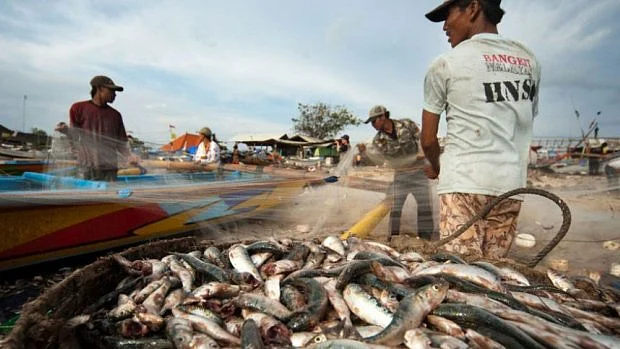Humans in chains being paraded to be sold off as labourers, sized up and examined to be sure if they’re worth their price, if they’re men with sturdy builds or young virgins – this understanding of slavery has long been replaced by a more modern understanding of what slavery is.
Forced marriages, debt labourers, trafficked workers, child labourers – all fall under the category of modern slavery. In Thailand migrant labourers from poorer neighbours such as Myanmar and Cambodia are often sold or lured by false promises and end up becoming bonded labourers.
On November 23, an unusual disclosure came from Geneva-based Nestle which had conducted a year-long self-policing internal investigation. It stated that migrant labourers in Thailand were forced to catch and process fish that ends up in the global food giant Nestle’s supply chain.
Nestle is not a major purchaser of seafood in South East Asia but does some business in Thailand, primarily for its Purina brand Fancy Feast cat food. The investigation by a non-profit organisation Verite which was commissioned by Nestle was revealed in December 2014, after reports from news outlets and non-governmental organisations tied brutal and largely unregulated working conditions to their shrimp and prawn industry and Purina brand pet foods.
The Verite study found out that this situation of abuse is not unique to Nestle but virtually all US and European companies buying seafood from Thailand. After the migrant labourers arrive in Thailand, brokers illegally charge excessive fees to get them jobs, trapping them into working on fishing vessels and at ports, mills and seafood farms in Thailand to pay back more money than they will ever earn.
“Sometimes, the net is too heavy and workers get pulled into the water and just disappear. When someone dies, he gets thrown into the water,” one Burmese worker told the non-profit organisation.
I have been working on this boat for 10 years. I have no savings. I am barely surviving.Unnamed labourer
Verite visited fish ports, fishmeal packing plants, shrimp farms and docked fishing boats in Thailand to interview more than 100 people for its study that included about 80 workers from Myanmar and Cambodia, as well as boat owner, shrimp farm owners, site supervisors and representatives of Nestle’s suppliers.
The Thai seafood sector which is a booming industry exports $7 billion worth of products every year. However, boat captains and managers, along with workers, confirmed violence and danger in this job.
Nestle said it would post the reports online — as well as a detailed year-long solution strategy throughout 2016 — as part of ongoing efforts to protect workers. It has promised to impose new requirements on all potential suppliers and train boat owners and captains about human rights, possibly with a demonstration vessel and rewards for altering their practices. It also plans to bring in outside auditors and assign a high-level Nestle manager to make sure change is underway.
As we’ve said consistently, forced labour and human rights abuses have no place in our supply chain, Nestlé believes that by working with suppliers we can make a positive difference to the sourcing of ingredients.Magdi Batato, Executive Vice-President, Nestle
Nestle’s disclosure is rare. While multinational companies in industries from garments to electronics say they investigate allegations of abuse in their supply chains, they rarely share negative findings.
“It’s unusual and exemplary,” said Mark Lagon, president of the non-profit Freedom House, a Washington-based anti-trafficking organisation. “The propensity of the PR and legal departments of companies is not to ‘fess up, not to even say they are carefully looking into a problem for fear that they will get hit with lawsuits,” he said.
In fact, Nestle is already being sued: In August, pet food buyers filed a class-action lawsuit alleging Fancy Feast cat food was the product of slave labor associated with Thai Union Frozen Products, a major distributor. It’s one of several lawsuits filed in recent months against major US retailers importing seafood from Thailand.
Nestle promises to publicly report its progress each year.
(With inputs from AP.)
(At The Quint, we question everything. Play an active role in shaping our journalism by becoming a member today.)
